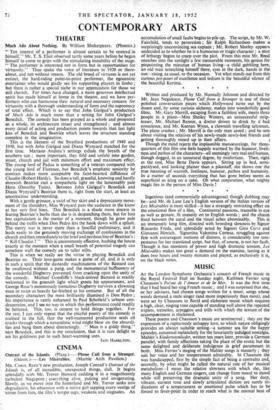CONTEMPORARY ARTS
THEATRE
Much Ado About Nothing. By William Shakespeare. (Phoenix.) THE interest of a performer is almost rPrtnin to be centred in himself," Mr. T. S. Eliot observed tartly some years before he began himself to come to grips with the stimulating instability of the stage. "The performer is interested not in form but in opportunities for virtuosity." Thus spake the voice of literature in 1920 or there- about, and not without reason. The old breed of virtuoso is not yet extinct, the hard-riding point-to-point perfoimer, the egOcentric entertainer who would gladly see his supporting players in limbo ; but there is rather a special niche in our appreciation for those we Mill cherish. For times have changed, a more generous intellectual spirit has made himself at home in the theatre, and we have per- _ formers who can harmonise their natural and necessary concern for virtuosity with a thorough understanding of form and the supremacy of total effect. Which is to say that John Gielgud's production Of Much Ado is much more than a setting for John Gielgud's Benedick. The comedy has been grasped as a whole and presented as a whole, its architecture intact and strengthened ; and almost every detail of acting and production points towards that last light kiss of Benedick and Beatrice which leaves the structure standing complete in the imagination.
This is the likeness of the Stratford productions of 1949 and 1950, but with John Gielgud and Diana Wynyard matched for the first time. Mariano Andreu's settings exhale the breath of the southern sun ; more important, they fold and unfold into- garden, street, church and jail with minimum effort and maximum effect. The- young lord of Padua is something of a veteran compared with the young lord of Florence, but Benedick's emphatic seniority by contrast makes more acceptable the faint-hearted diffidence of Claudio (Robert Hardy). So does a tall, graceful, knowing and hardly shrewish Beatrice cast a sympathetic light on the lamentably pale Hero (Dorothy Tutin). Between John Gielgud's Benedick and- Diana Wynyard's Beatrice there is, right from the start, at least an unconscious understanding.
With a gentle grimace, a swirl of her skirt and a deprecatory move- ment of the shoulders, Miss Wynyard puts the audience in the know at her very first lines. This Benedick is a shade more sincere in fearing Beatrice's barbs than she is in despatching them, but for him too capitulation is the matter of a moment, though he grow pale behind the trellis when Don Pedro lets the hook down with a splash.
The merry war is never more than a fanciful preliminary, and it leads easily to the genuinely moving exchange of confessions in the church and then immediately to the brief and perilous line of Beatrice's :- " Kill Claudio ! " This is uncommonly effective, hushing the house, exactly at the moment when a small breath of potential tragedy can somehow waft the comedy on to taller stilts.
This is._ when we really see the virtue in. playing Benedick and Beatrice so. Their love-game makes a game of all, and it is only in such a spirit that the dastardly machinations of the Bastard can be swallowed without a pang, and the monumental buffoonery of the wonderful Dogberry prevented from cracking open the unity of the comedy. Michael Goodliffe's black-attired Bastard is readily welcomed in the greenish light which greets his appearances, and George Rose's monstrously tremulous Dogberry survives a clowning once or twice as heavily far-fetched as his costume. But of all the secondary characters the most brilliantly illumined is Don Pedro ; his importance is vastly enhanced by Paul Schofield's urbane con- descension, and I see no way in which this performance could readily be bettered. This, too, is cement to hold things together. For the rest, I can only repeat that the playful poetry of the comedy is realised to the full, that the well-mannered production seals all cracks through which a naturalistic wind might blow on the absurdi- ties and bang them about distractingly. " Man is a giddy thing," says Benedick, and this is my conclusion, that it is rare delight to see his giddiness put to such heart-warming uses.
LAIN HAMILTON.


































 Previous page
Previous page